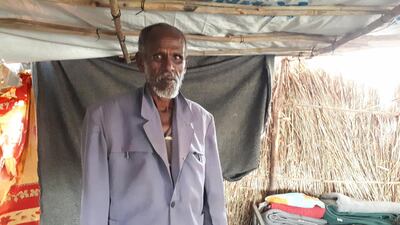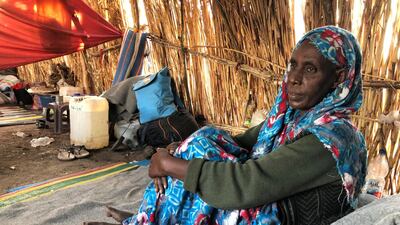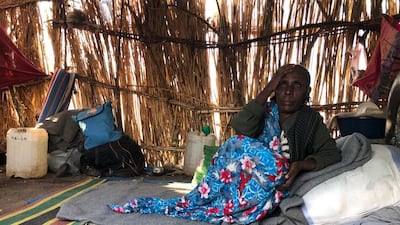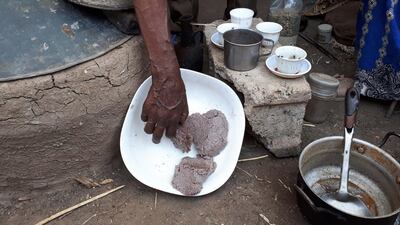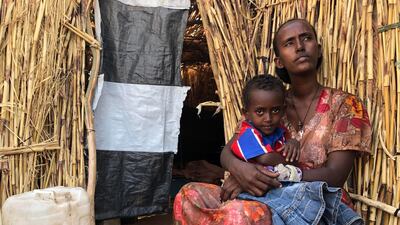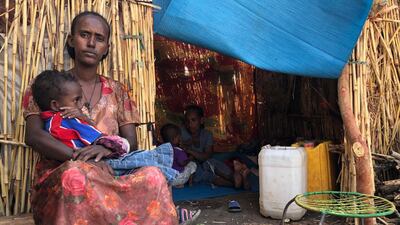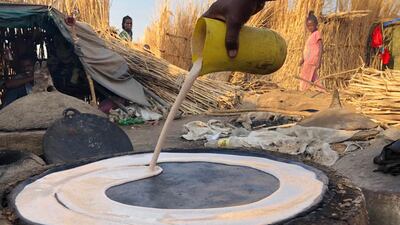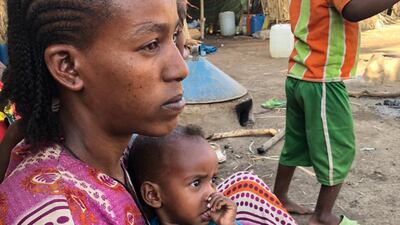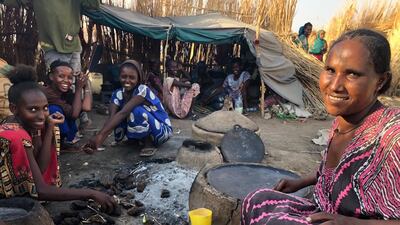After trekking for days to safety in Sudan, some of Tigray's 60,000 refugees are making the difficult decision to head back across the border into the war-zone they fled in Ethiopia to feed their families.
After arriving at transit shelters, refugees become disillusioned with the grim conditions in overflowing camps and food shortages as their fear for the family they left behind keeps them stagnant in temporary shelters, NGO Médecins Sans Frontières (MSF) said.
“There isn’t enough food at the reception centre. Sometimes, the food runs out before all the people have received their portion,” 60 year-old Tigrayan refugee, Hadahra, who is staying at the reception centre in Hemdayet, told an MSF team.
“I am an old, sick woman so I eat little. But for the rest of my family, they go to the forest or to the river banks to collect wood to sell and pay for ingredients.”
Safety is no issue for Ms Hadahra, but seeing people going back worries her.
"What level of desperation must you feel to go back to an extremely dangerous war-zone as the only way of finding something to sell to buy food or get food. These are desperate acts being taken by people wanting to take care of their family," MSF General Director Stephen Cornish told The National.
MSF did not provide an official figure for the number of refugees returning to Tigray for food, but said it noticed a trend based on conversations in Sudan's camps.
Civilians targeted
Returnees will find a region still in the heat of battle months after Prime Minister Abiy Ahmed’s government declared "victory’" against the separatist Tigray People’s Liberation Front (TPLF) in the capital Mekelle.
Reports of human rights violations are still rife in Ethiopia’s war torn Tigray region.
Mr Cornish recounted some of the horrific tales he heard from survivors, haunting him weeks after returning from Sudan’s transit camp in Al Hashabat on the border with Tigray, and the "permanent" but overpopulated camp in Um Rakuba.
“Most of the people I spoke with there said their homes were bombed with mortars and when they fled, ran into soldiers who opened fire or stabbed them to death,” he said.
“One man told me he went to help his pregnant neighbour leave the house with her kids. She was shot and killed in front of him. He had to flee and leave her there.”
These are some of their many traumatic experiences.
“They are constantly replaying the fear and trauma they experienced. Mental health and receiving psychological support for PTSD is very important,” he said.
“Another man who was imprisoned with several thousand people in an unofficial prison with his sister and her children was able to escape leaving the sister and her kids behind in prison," he added.
The man was detained for 20 days and told Mr Cornish that the guards would get drunk, beat people with their rifles and rape teenagers and young women at gun point.
"People carry a lot on their souls.”
Of the 61,000 people who have managed to escape into Sudan, the Hashabat transit camp, known as Village 8, holds some 2,000 people, many of whom are unwilling to move to permanent shelters.
They wish to remain in the hope that some of their family members back home manage to join them.
But the likelihood of that is dwindling.
Human trafficking
“Belligerent parties have blocked the border into Sudan. People are paying traffickers anywhere between 1000 Birr ($24) to 5000 Birr ($121) to help them cross via unofficial routes.”
After humanitarian organisations spotlighted credible reports of rape in Tigray and other forms of sexual violence, the Ethiopian government conceded that these incidents took place.
“We have set-up mental, psycho and social support teams in the Tigray region, to help treat physical and psychological scars, as well as other social issues resulting from violence, intimidation and displacement,” Ethiopia’s Minister for Women, Children and Youth Filsan Abdullahi Ahmed said in February.
However, half of Tigray’s medical centres are currently not functional, MSF and other aid groups have found. Ethiopian officials have pushed back on those claims saying the conditions have improved since the conflict began.
Amid information blackouts and poor communication infrastructure, it is difficult to gauge the extent of the devastation that Tigray has witnessed.
"There is a lot of not knowing. While some communication has been re-established, and we were able to call and find news of people's loved-ones, many were afraid to call home because they believed authorities could track their relatives in Tigray and put them at risk," Mr Cornish said.
"Despite the overpopulated living conditions where diarrhoea, respiratory illnesses, urinary tract infections and even malaria have run rampant, many people's main concerns remain for the family members that they left behind," he added. For now, only a handful of coronavirus cases have been detected in Um Rakuba making the virus a concern but not the main one, due to the prevalence of more illnesses as a result of poor living conditions.
"We are speaking with the authorities and the UN to bring the right quality of assistance to the refugees," Mr Cornish said.
Currently some people are having to wait months before getting their own tents, and have ended up sharing communal shelters with strangers, despite having a vulnerable status such as being pregnant or elderly.
"The level of assistance is lacking. They say the tents are coming but it's all taking too much time."
